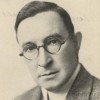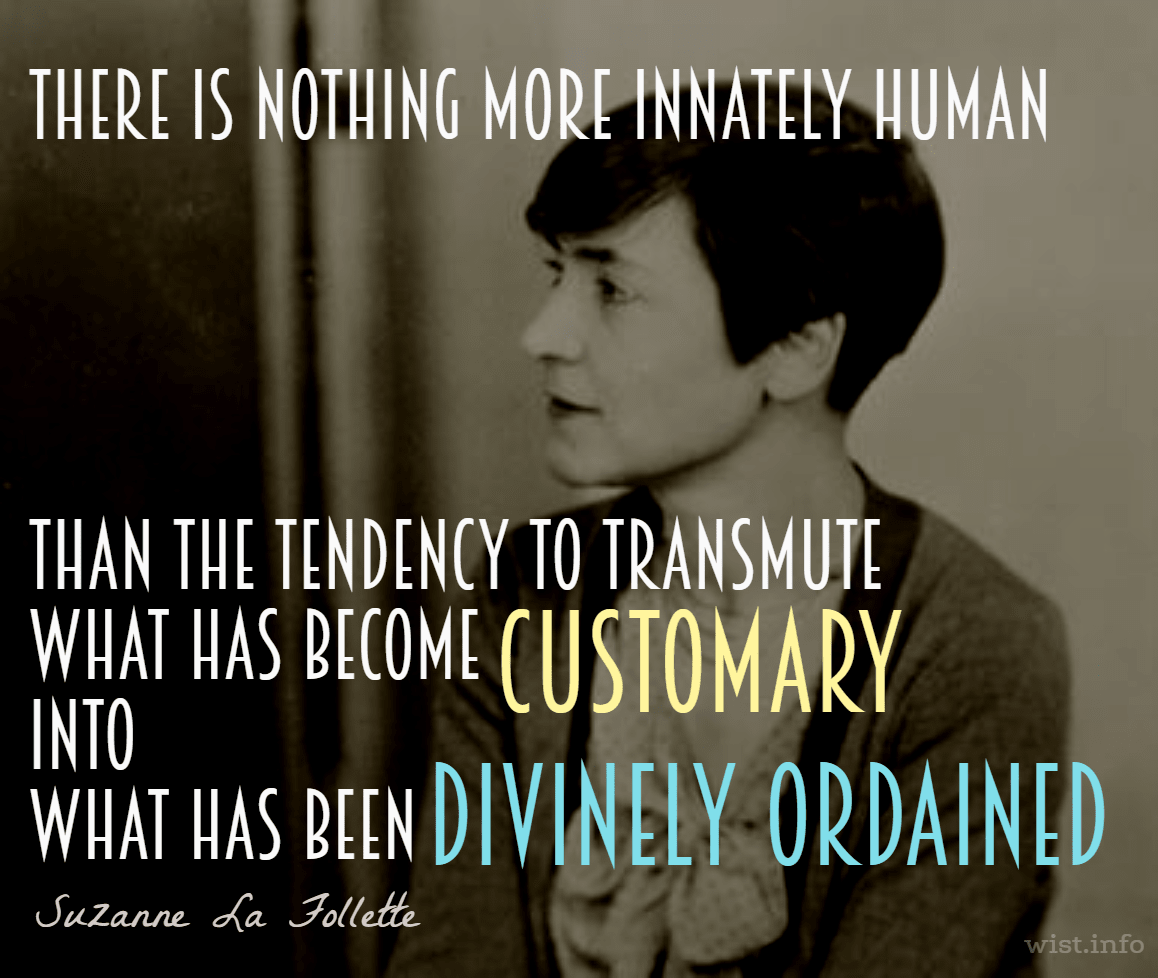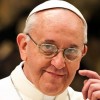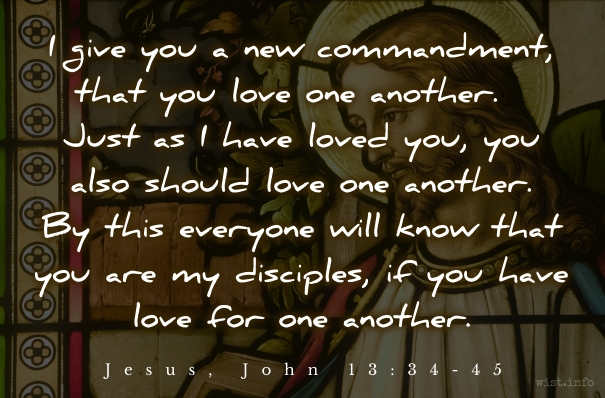Now Scripture enjoins nothing except charity, and condemns nothing except lust, and in that way fashions the lives of men.
[Non autem praecipit Scriptura nisi caritatem, nec culpat nisi cupiditatem, et eo modo informat mores hominum.]
Augustine of Hippo (354-430) Christian church father, philosopher, saint [b. Aurelius Augustinus]
On Christian Doctrine [De Doctrina Christiana], Book 3, ch. 10 / § 15 (3.10.15) (AD 397) [tr. Shaw (1858)]
(Source)
On how people treat Scripture as literal when it agrees with their and their culture's judgment, and figurative when not.
(Source (Latin)). Alternate translations:
But Scripture teaches nothing but charity, nor condemns anything except cupidity, and in this way shapes the minds of men.
[tr. Robertson (1958)]
Scripture enjoins nothing but love, and centures nothing but lust, and moulds men's minds accordingly.
[tr. Green (1995)]
Quotations about:
commandment
Note not all quotations have been tagged, so Search may find additional quotes on this topic.
On the subject of Biblical texts and examples to why you can’t do certain things with your body that you wish to, I find that absolutely absurd. I’ve always been extremely uncomfortable with the idea in any society that belief is based on revealed truth, that’s to say on a text like a Bible or a Qur’an, or whatever it is. It seems to me that the greatness of our culture, for all its incredible faults, is that we have grown up on the Greek ideal of discovering the truth, discovering by looking around us, by empirical experiment, by the combination of the experience of generations of ancestors who have contributed to our sum knowledge of the way the world works, and so on. And to have that snatched away and to be told what to think by a book, however great it may be in places, this is a book that says you can sell your daughter into slavery, it’s a book that bans menstruating women from within miles of temples. The fact that it also says that for one man to lie with another man is an abomination, is no more made relevant or important than the fact that you can’t eat shellfish.
Stephen Fry (b. 1957) British actor, writer, comedian
An Evening with Callow & Fry, Norwich (2003-12)
(Source)
We are obligated to be more scrupulous in fulfilling the commandment of charity than any other positive commandment because charity is the sign of a righteous man, the seed of Abraham our Father.
Maimonides (1135-1204) Spanish Jewish philosopher, scholar, astronomer, physician [Moses ben Maimon, Rambam, רמב״ם]
Mishneh Torah [Repetition of the Torah] / Sefer Yad ha-Hazaka [The Strong Hand], Book 7 “Seeds [Sefer Zeraim],” ch. 10, #1 (1180)
(Source)
As quoted in Isadore Twersky, ed., A Maimonides Reader (1972), and the most common English translation. Alternate translation:
We must be especially careful to observe the mitzvah of tzedakah, more so than any other positive mitzvah, for tzedakah is a sign of the righteous [tzadik] lineage of Abraham, our father.
[tr. Meszler (2003)]
More discussion of the connotations of the Hebrew tzedakah that are not covered by the English charity here: Tzedakah - charity in the Jewish tradition - BJE
The whole philosophy of life can be summed up in two little words: be kind.
The question I get asked by religious people all the time is, without God, what’s to stop me from raping all I want? And my answer is: I do rape all I want. And the amount I want is zero. And I do murder all I want, and the amount I want is zero. The fact that these people think that if they didn’t have this person watching over them that they would go on killing, raping rampages is the most self-damning thing I can imagine. I don’t want to do that. Right now, without any god, I don’t want to jump across this table and strangle you. I have no desire to strangle you. I have no desire to flip you over and rape you.
Penn Jillette (b. 1955) American stage magician, actor, musician, author
“Penn Jillette Rapes All the Women He Wants To,” Interview by Ron Bennington,Interrobang (30 Apr 2012)
(Source)
If a man who was rich enough in this world’s goods saw that one of his brothers was in need, but closed his heart to him, how could the love of God be living in him? My children, our love is not to be just words or mere talk, but something real and active.
The Bible (The New Testament) (AD 1st - 2nd C) Christian sacred scripture
1 John 3:17-18 [JB (1966)]
(Source)
Alternate translations:
But whoso hath this world's good, and seeth his brother have need, and shutteth up his bowels of compassion from him, how dwelleth the love of God in him?
My little children, let us not love in word, neither in tongue; but in deed and in truth.
[KJV (1611)]
If we are rich and see others in need, yet close our hearts against them, how can we claim that we love God? My children, our love should not be just words and talk; it must be true love, which shows itself in action.
[GNT (1976)]
If anyone is well-off in worldly possessions and sees his brother in need but closes his heart to him, how can the love of God be remaining in him? Children, our love must be not just words or mere talk, but something active and genuine.
[NJB (1985)]
But if someone has material possessions and sees a brother or sister in need but refuses to help—how can the love of God dwell in a person like that?
Little children, let’s not love with words or speech but with action and truth.
[CEB (2011)]
If anyone has material possessions and sees a brother or sister in need but has no pity on them, how can the love of God be in that person? Dear children, let us not love with words or speech but with actions and in truth.
[NIV (2011)]
How does God’s love abide in anyone who has the world’s goods and sees a brother or sister in need and yet refuses help?
Little children, let us love, not in word or speech, but in truth and action.
[NRSV (2021 ed.)]
How long will you judge unjustly
and show partiality to the wicked? Selah
Give justice to the weak and the orphan;
maintain the right of the lowly and the destitute.
Rescue the weak and the needy;
deliver them from the hand of the wicked.The Bible (The Old Testament) (14th - 2nd C BC) Judeo-Christian sacred scripture [Tanakh, Hebrew Bible], incl. the Apocrypha (Deuterocanonicals)
Psalm 82:2-4 [NRSV (2021 ed.)]
(Source)
Alternate translations:
How long will ye judge unjustly, and accept the persons of the wicked? Selah.
Defend the poor and fatherless: do justice to the afflicted and needy.
Deliver the poor and needy: rid them out of the hand of the wicked.
[KJV (1611)]
No more mockery of justice,
no more favouring the wicked! Pause
Let the weak and the orphan have justice,
be fair to the wretched and destitute;
rescue the weak and needy,
save them from the clutches of the wicked!
[JB (1966)]
You must stop judging unjustly;
you must no longer be partial to the wicked!
Defend the rights of the poor and the orphans;
be fair to the needy and the helpless.
Rescue them from the power of evil people.
[GNT (1976)]
How much longer will you give unjust judgements and uphold the prestige of the wicked? Pause
Let the weak and the orphan have justice, be fair to the wretched and the destitute.
Rescue the weak and the needy, save them from the clutches of the wicked.
[NJB (1985)]
How long will you judge unjustly
by granting favor to the wicked? Selah
Give justice to the lowly and the orphan;
maintain the right of the poor and the destitute!
Rescue the lowly and the needy.
Deliver them from the power of the wicked!
[CEB (2011)]
How long will you judge perversely,
showing favor to the wicked? Selah.
Judge the wretched and the orphan,
vindicate the lowly and the poor,
rescue the wretched and the needy;
save them from the hand of the wicked.
[RJPS (2023 ed.)]
Jesus replied, “A man was going down from Jerusalem to Jericho, and fell into the hands of robbers, who stripped him, beat him, and went away, leaving him half dead. Now by chance a priest was going down that road; and when he saw him, he passed by on the other side. So likewise a Levite, when he came to the place and saw him, passed by on the other side.
But a Samaritan while traveling came near him; and when he saw him, he was moved with pity. He went to him and bandaged his wounds, having poured oil and wine on them. Then he put him on his own animal, brought him to an inn, and took care of him. The next day he took out two denarii, gave them to the innkeeper, and said, ‘Take care of him; and when I come back, I will repay you whatever more you spend.’
Which of these three, do you think, was a neighbor to the man who fell into the hands of the robbers?” He said, “The one who showed him mercy.” Jesus said to him, “Go and do likewise.”
The Bible (The New Testament) (AD 1st - 2nd C) Christian sacred scripture
Luke 10:30-37 [NRSV]
(Source)
Alt. trans. [KJV]: "And Jesus answering said, A certain man went down from Jerusalem to Jericho, and fell among thieves, which stripped him of his raiment, and wounded him, and departed, leaving him half dead. And by chance there came down a certain priest that way: and when he saw him, he passed by on the other side. And likewise a Levite, when he was at the place, came and looked on him, and passed by on the other side. But a certain Samaritan, as he journeyed, came where he was: and when he saw him, he had compassion on him, and went to him, and bound up his wounds, pouring in oil and wine, and set him on his own beast, and brought him to an inn, and took care of him. And on the morrow when he departed, he took out two pence, and gave them to the host, and said unto him, Take care of him; and whatsoever thou spendest more, when I come again, I will repay thee. Which now of these three, thinkest thou, was neighbour unto him that fell among the thieves? And he said, He that shewed mercy on him. Then said Jesus unto him, Go, and do thou likewise."
Alt. trans. [GNT]: "Jesus answered, “There was once a man who was going down from Jerusalem to Jericho when robbers attacked him, stripped him, and beat him up, leaving him half dead. It so happened that a priest was going down that road; but when he saw the man, he walked on by on the other side. In the same way a Levite also came there, went over and looked at the man, and then walked on by on the other side. But a Samaritan who was traveling that way came upon the man, and when he saw him, his heart was filled with pity. He went over to him, poured oil and wine on his wounds and bandaged them; then he put the man on his own animal and took him to an inn, where he took care of him. The next day he took out two silver coins and gave them to the innkeeper. ‘Take care of him,’ he told the innkeeper, ‘and when I come back this way, I will pay you whatever else you spend on him.’” And Jesus concluded, “In your opinion, which one of these three acted like a neighbor toward the man attacked by the robbers?” The teacher of the Law answered, “The one who was kind to him.” Jesus replied, “You go, then, and do the same.”
For Yahweh your God is God of gods and Lord of lords, the great God, triumphant and terrible, never partial, never to be bribed. It is he who sees justice done for the orphan and the widow, who loves the stranger and gives him food and clothing. Love the stranger then, for you were strangers in the land of Egypt.
The Bible (The Old Testament) (14th - 2nd C BC) Judeo-Christian sacred scripture [Tanakh, Hebrew Bible], incl. the Apocrypha (Deuterocanonicals)
Deuteronomy 10:17-19 [JB (1966)]
(Source)
Alternate translations:
For the Lord your God is God of gods, and Lord of lords, a great God, a mighty, and a terrible, which regardeth not persons, nor taketh reward: He doth execute the judgment of the fatherless and widow, and loveth the stranger, in giving him food and raiment. Love ye therefore the stranger: for ye were strangers in the land of Egypt.
[KJV (1611)]
The Lord your God is supreme over all gods and over all powers. He is great and mighty, and he is to be obeyed. He does not show partiality, and he does not accept bribes. He makes sure that orphans and widows are treated fairly; he loves the foreigners who live with our people, and gives them food and clothes. So then, show love for those foreigners, because you were once foreigners in Egypt.
[GNT (1976)]
For the Lord your God is God of gods and Lord of lords, the great God, mighty and awesome, who is not partial and takes no bribe, who executes justice for the orphan and the widow, and who loves the strangers, providing them food and clothing. You shall also love the stranger, for you were strangers in the land of Egypt.
[NRSV (1989 ed.)]
For your God יהוה is God supreme and Lord supreme, the great, the mighty, and the awesome God, who shows no favor and takes no bribe, but upholds the cause of the fatherless and the widow, and befriends the stranger, providing food and clothing. -- You too must befriend the stranger, for you were strangers in the land of Egypt.
[RJPS (2006)]
For the Lord your God is God of gods and Lord of lords, the great God, mighty and awesome, who shows no partiality and accepts no bribes. He defends the cause of the fatherless and the widow, and loves the foreigner residing among you, giving them food and clothing. And you are to love those who are foreigners, for you yourselves were foreigners in Egypt.
[NIV (2011 ed.)]
Yahweh says this: Practice honesty and integrity; rescue the man who has been wronged from the hands of his oppressor; do not exploit the stranger, the orphan, the widow; do no violence; shed no innocent blood in this place.
The Bible (The Old Testament) (14th - 2nd C BC) Judeo-Christian sacred scripture [Tanakh, Hebrew Bible], incl. the Apocrypha (Deuterocanonicals)
Jeremiah 22:3 [JB (1966)]
(Source)
Alternate translations:
Thus saith the Lord; Execute ye judgment and righteousness, and deliver the spoiled out of the hand of the oppressor: and do no wrong, do no violence to the stranger, the fatherless, nor the widow, neither shed innocent blood in this place.
[KJV (1611)]
I, the Lord, command you to do what is just and right. Protect the person who is being cheated from the one who is cheating him. Do not mistreat or oppress aliens, orphans, or widows; and do not kill innocent people in this holy place.
[GNT (1976)]
Yahweh says this: Act uprightly and justly; rescue from the hands of the oppressor anyone who has been wronged, do not exploit or ill-treat the stranger, the orphan, the widow; shed no innocent blood in this place.
[NJB (1985)]
Thus says the Lord: Act with justice and righteousness, and deliver from the hand of the oppressor anyone who has been robbed. And do no wrong or violence to the alien, the orphan, and the widow, or shed innocent blood in this place.
[NRSV (1989 ed.)]
Thus said GOD: Do what is just and right; rescue from the defrauder anyone who is robbed; do not wrong the stranger, the fatherless, and the widow; commit no lawless act, and do not shed the blood of the innocent in this place.
[RJPS (2023 ed.)]
Wash yourselves clean; put your evil doings away from My sight. Cease to do evil; learn to do good. Devote yourselves to justice; aid the wronged. Uphold the rights of the orphan; defend the cause of the widow.
The Bible (The Old Testament) (14th - 2nd C BC) Judeo-Christian sacred scripture [Tanakh, Hebrew Bible], incl. the Apocrypha (Deuterocanonicals)
Isaiah 1:16-17 [JPS (1985)]
(Source)
Alternate translations:
Wash you, make you clean; put away the evil of your doings from before mine eyes; cease to do evil; learn to do well; seek judgment, relieve the oppressed, judge the fatherless, plead for the widow.
[KJV (1611)]
Wash yourselves, make yourselves clean; Remove the evil of your deeds from My sight. Cease to do evil, learn to do good; seek justice, reprove the ruthless, refend the orphan, plead for the widow.
[NASB (1960)]
Wash, make yourselves clean. Take your wrong-doing out of my sight. Cease to do evil. Learn to do good, search for justice, help the oppressed, be just to the orphan, plead for the widow.
[JB (1966)]
Wash yourselves clean. Stop all this evil that I see you doing. Yes, stop doing evil and learn to do right. See that justice is done -- help those who are oppressed, give orphans their rights, and defend widows.
[GNT (1976)]
Wash yourselves; make yourselves clean; remove the evil of your doings from before my eyes; cease to do evil; learn to do good; seek justice; rescue the oppressed; defend the orphan; plead for the widow.
[NRSV (1989 ed.)]
Wash yourselves; make yourselves clean; remove the evil of your deeds from before my eyes; cease to do evil, learn to do good; seek justice, correct oppression; bring justice to the fatherless; plead the widow's cause.
[ESV (2001)]
Deeds of kindness are equal in weight to all the commandments.
The Talmud (AD 200-500) Collection of Jewish rabbinical writings
Mishnah, Zeraim, Pe’ah 4:19
(Source)
Those Divine demands which sound to our natural ears most like those of a despot and least like those of a lover, in fact marshal us where we should want to go if we knew what we wanted. He demands our worship, our obedience, our prostration. Do we suppose that they can do Him any good, or fear, like the chorus in Milton, that human irreverence can bring about ‘His glory’s diminution’? A man can no more diminish God’s glory by refusing to worship Him than a lunatic can put out the sun by scribbling the word ‘darkness’ on the walls of his cell. But God wills our good, and our good is to love Him (with that responsive love proper to creatures) and to love Him we must know Him: and if we know Him, we shall in fact fall on our faces. If we do not, that only shows that what we are trying to love is not yet God — though it may be the nearest approximation to God which our thought and fantasy can attain. Yet the call is not only to prostration and awe; it is to a reflection of the Divine life, a creaturely participation in the Divine attributes which is far beyond our present desires. We are bidden to ‘put on Christ’, to become like God. That is, whether we like it or not, God intends to give us what we need, not what we now think we want. Once more, we are embarrassed by the intolerable compliment, by too much love, not too little.
The Lord created us in His image and likeness, and we are the image of the Lord, and He does good and all of us have this commandment at heart: do good and do not do evil. All of us. “But, Father, this is not Catholic! He cannot do good.” Yes, he can. He must. Not can: must! Because he has this commandment within him. Instead, this “closing off” that imagines that those outside, everyone, cannot do good is a wall that leads to war and also to what some people throughout history have conceived of: killing in the name of God. That we can kill in the name of God. And that, simply, is blasphemy. To say that you can kill in the name of God is blasphemy.
Francis I (b. 1936) Argentinian Catholic Pope (2013- ) [b. Jorge Mario Bergoglio]
Homily (22 May 2013)
(Source)
Thus says the Lord of hosts: Render true judgments, show kindness and mercy to one another; do not oppress the widow, the orphan, the alien, or the poor; and do not devise evil in your hearts against one another.
But they refused to listen and turned a stubborn shoulder and stopped their ears in order not to hear. They made their hearts adamant in order not to hear the law and the words that the Lord of hosts had sent by his spirit through the former prophets. Therefore great wrath came from the Lord of hosts.The Bible (The Old Testament) (14th - 2nd C BC) Judeo-Christian sacred scripture [Tanakh, Hebrew Bible], incl. the Apocrypha (Deuterocanonicals)
Zechariah 7:9-12 [NRSV (2021 ed.)]
(Source)
Alternate translations:
Thus speaketh the Lord of hosts, saying, Execute true judgment, and shew mercy and compassions every man to his brother:
And oppress not the widow, nor the fatherless, the stranger, nor the poor; and let none of you imagine evil against his brother in your heart.
But they refused to hearken, and pulled away the shoulder, and stopped their ears, that they should not hear.
Yea, they made their hearts as an adamant stone, lest they should hear the law, and the words which the Lord of hosts hath sent in his spirit by the former prophets: therefore came a great wrath from the Lord of hosts.
[KJV (1611)]
Yahweh Sabaoth says this. He said, "Apply the law fairly, and practice kindness and compassion towards one another. Do not oppress the widow and the orphan, the settler and the poor man, and do not secretly plan evil against one another." But they would not pay attention; they turned a petulant shoulder; they stopped their ears rather than hear; they made their hearts adamant rather than listen to the teaching and the words that Yahweh Sabaoth had sent by his spirit through the prophets in the past. This aroused great anger on the part of of Yahweh Sabaoth overtook them.
[JB (1966)]
“Long ago I gave these commands to my people: ‘You must see that justice is done, and must show kindness and mercy to one another. Do not oppress widows, orphans, foreigners who live among you, or anyone else in need. And do not plan ways of harming one another.’
“But my people stubbornly refused to listen. They closed their minds and made their hearts as hard as rock. Because they would not listen to the teaching which I sent through the prophets who lived long ago, I became very angry."
[GNT (1976)]
'Yahweh Sabaoth says this. He said, "Apply the law fairly, and show faithful love and compassion towards one another.
Do not oppress the widow and the orphan, the foreigner and the poor, and do not secretly plan evil against one another."
But they would not listen; they turned a rebellious shoulder; they stopped their ears rather than hear;
they made their hearts adamant rather than listen to the teaching and the words that Yahweh Sabaoth had sent -- by his spirit -- through the prophets in the past; and consequently the fury of Yahweh Sabaoth overtook them.
[NJB (1985)]
The Lord of heavenly forces proclaims:
Make just and faithful decisions; show kindness and compassion to each other! Don’t oppress the widow, the orphan, the stranger, and the poor; don’t plan evil against each other! But they refused to pay attention. They turned a cold shoulder and stopped listening.
They steeled their hearts against hearing the Instruction and the words that the Lord of heavenly forces sent by his spirit through the earlier prophets. As a result, the Lord of heavenly forces became enraged.
[CEB (2011)]
Thus said GOD of Hosts: Execute true justice; deal loyally and compassionately with one another.
Do not defraud the widow, the orphan, the stranger, and the poor; and do not plot evil against one another. --
But they refused to pay heed. They presented a balky back and turned a deaf ear.
They hardened their hearts like adamant against heeding the instruction and admonition that GOD of Hosts sent to them by divine spirit through the earlier prophets; and a terrible wrath issued from GOD of Hosts.
[RJPS (2023 ed.)]
I give you a new commandment, that you love one another. Just as I have loved you, you also should love one another. By this everyone will know that you are my disciples, if you have love for one another.
The Bible (The New Testament) (AD 1st - 2nd C) Christian sacred scripture
John 13:34-45 (NRSV)
Alternate translations:
- NIV: "A new command I give you: Love one another. As I have loved you, so you must love one another. By this all men will know that you are my disciples, if you love one another."
- KJV: "A new commandment I give unto you, That ye love one another; as I have loved you, that ye also love one another. By this shall all men know that ye are my disciples, if ye have love one to another."
- "A new commandment I give to you, that you love one another; even as I have loved you, that you also love one another. By this all men will know that you are my disciples, if you have love for one another."
See Matthew 22:36-40.
“Teacher, which is the greatest commandment in the Law?” Jesus replied: ” ‘Love the Lord your God with all your heart and with all your soul and with all your mind.’ This is the first and greatest commandment. And the second is like it: ‘Love your neighbor as yourself.’ All the Law and the Prophets hang on these two commandments.”
Good Master, how shall I recount this Thine inestimable charity?
What return can I make for this vast boon? […]
What reward shall I give my God,
except my heart’s obedience to His command?
And Thy command is this:
that we love one another.
They say that God says to me, “Forgive your enemies.” I say, “I do”; but he says, “I will damn mine.” God should be consistent. If he wants me to forgive my enemies he should forgive his.
But when erring reason proposes something as being commanded by God, then to scorn the dictate of reason is to scorn the commandment of God.
Thomas Aquinas (1225-1274) Italian friar, philosopher, theologian
Summa Theologica 1a-2ae, q. 19, art. 5, ad 2 (1265-1274)
(Source)
Often quoted without the first clause, which changes the meaning. Alt. trans.: "To disparage the dictate of reason is equivalent to contemning the command of God."
I have no use for the strictures of You must. You must not.
[無可無不可]
Confucius (c. 551- c. 479 BC) Chinese philosopher, sage, politician [孔夫子 (Kǒng Fūzǐ, K'ung Fu-tzu, K'ung Fu Tse), 孔子 (Kǒngzǐ, Chungni), 孔丘 (Kǒng Qiū, K'ung Ch'iu)]
The Analects [論語, 论语, Lúnyǔ], Book 18, verse 8 (18.8.5) (6th C. BC) [ed. Lao-Tse, tr. Hinton (1998)]
(Source)
(Source (Chinese)). Alternate translations:
I have no course for which I am predetermined, and no course against which I am predetermined.
[tr. Legge (1861)]
I will take no liberties, I will have no curtailing of my liberty.
[tr. Jennings (1895); in the footnote he gives a more raw translation, "Without possibilities (or freedom to act) -- without impossibilities"]
With me there is no inflexible "thou shalt" or 'thou shalt not."
[tr. Soothill (1910)]
I have no categoric can and cannot.
[tr. Pound (1933)]
I have no "thou shalt" or "thou shalt not."
[tr. Waley (1938)]
I accept life as it comes. [tr. Ware (1950)]I have no preconceptions about the permissible and the impermissible.
[tr. Lau (1979)]
I avoid saying what should or should not be done.
[tr. Dawson (1993)]
I follow no rigid prescriptions on what should, or should not, be done.
[tr. Leys (1997)]
I have neither favorable nor unfavorable situation. [tr. Huang (1997)]I have not any stubborn positiveness or negation.
[tr. Cai/Yu (1998)]
I do not have presuppositions as to what may and may not be done.
[tr. Ames/Rosemont (1998)]
I have no "may" and no "may not."
[tr. Brooks/Brooks (1998)]
I have no preconceptions about what one can or cannot do.
[tr. Annping Chin (2014)]
This may be the source of Lin-Yutang, ed. The Wisdom of Confucius (1938):
The superior man goes through his life without any one preconceived course of action or any taboo. He merely decides for the moment what is the right thing to do.
Go, eat your bread in gladness, and drink your wine in joy.
The Bible (The Old Testament) (14th - 2nd C BC) Judeo-Christian sacred scripture [Tanakh, Hebrew Bible], incl. the Apocrypha (Deuterocanonicals)
Ecclesiastes 9:7 [JPS (1985)]
(Source)
Alternate translations:
Go thy way, eat thy bread with joy, and drink thy wine with a merry heart.
[KJV (1611)]
Go, eat your bread with joy and drink your wine with a glad heart.
[JB (1966)]
Go ahead -- eat your food and be happy; drink your wine and be cheerful.
[GNT (1976)]
Go, eat your bread with enjoyment and drink your wine with a merry heart.
[NRSV (1989 ed.)]


















